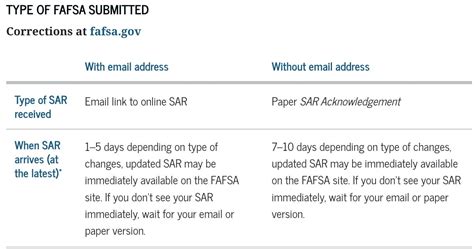How Long Does It Take for FAFSA to Process? A Complete Guide
Applying for financial aid for college can be stressful, and a big part of that stress comes from waiting for your FAFSA (Free Application for Federal Student Aid) to be processed. Knowing what to expect can ease your anxiety. This guide will break down FAFSA processing times and offer tips to expedite the process.
Understanding FAFSA Processing Times
The time it takes for FAFSA to process your application varies. While the official processing time is 3-5 weeks, several factors can influence this timeframe:
-
Completeness and Accuracy of your Application: A complete and accurate application is crucial. Missing information or errors will delay processing. Double-check everything before submitting.
-
IRS Data Retrieval: If you choose to use the IRS Data Retrieval Tool (DRT), your processing time may be faster as your tax information is automatically transferred. However, if you encounter issues with DRT, it could delay the process.
-
Verification: The Department of Education may select your application for verification. This involves providing additional documentation to verify your information. Verification adds significant time to the process, potentially extending it to 8-12 weeks or even longer.
-
System Issues: Like any large system, FAFSA can experience occasional technical difficulties that could cause processing delays.
What Happens During FAFSA Processing?
During processing, the federal processor verifies the information you provided against IRS and other databases. They check for accuracy and consistency. This process helps ensure that you are receiving the correct amount of aid you are eligible for.
Tips to Speed Up FAFSA Processing
Here are several actions you can take to help expedite your FAFSA processing time:
-
Complete the Application Carefully: Take your time to accurately fill out each section. One small error can lead to delays.
-
Use the IRS Data Retrieval Tool (DRT): The DRT automatically transfers your tax information, significantly reducing the chance of errors and speeding up the process.
-
Submit Early: Don't wait until the last minute! Applying early gives you more time to resolve any issues that may arise.
-
Maintain Accurate Contact Information: Ensure your contact information is up-to-date. The Department of Education may need to reach you if they have questions about your application.
-
Respond Promptly to Verification Requests: If your application is selected for verification, respond quickly and provide all necessary documentation. The quicker you respond, the faster your application will be processed.
What to Do If Your FAFSA is Taking Too Long
If it’s been longer than the expected processing time and you haven't received your Student Aid Report (SAR), check the FAFSA website for updates on the status of your application. You can also contact the FAFSA customer service for assistance.
Key Takeaways
While the typical FAFSA processing time is 3-5 weeks, it's essential to be prepared for potential delays. By following the tips mentioned above, you can significantly increase the likelihood of a faster processing time and reduce the stress associated with the application process. Remember, accurate and timely submission is key!
